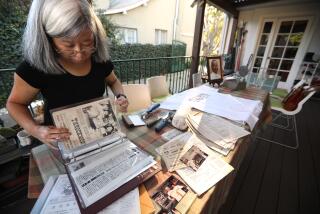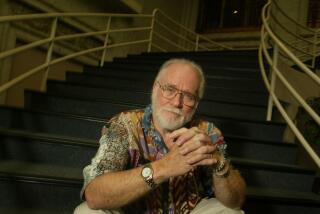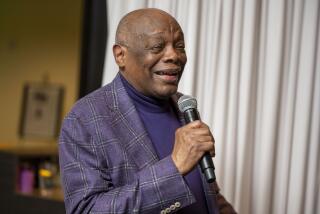PASSINGS: Al Ross, Albert Rodda, John G. McCoy
Al Ross
Founder of diner chain
Al Ross, 93, who founded Doggie Diner, a San Francisco Bay Area diner chain as famous for its giant fiberglass dachshund heads as for its food, died Wednesday at a care facility in Palm Springs, the San Francisco Chronicle reported.
Ross opened the first Doggie Diner in Oakland in 1948 and eventually ran 30 diners in the East Bay and San Francisco.
A former amateur boxer in his native Bronx, Ross moved from New York to Alameda with his family in his 20s.
He opened his first business, an ice cream parlor called White Castle, in Alameda with his mother, Rose Rosenbluth.
The hustle and bustle of Oakland’s San Pablo Avenue after World War II inspired Ross to open a restaurant featuring “wiener dogs.”
In 1979, Ross sold the diners and eventually retired to Palm Desert. The diners closed in 1986.
But the Doggie Diner heads were not forgotten. In 2000, fans of the heads led a campaign to save the last surviving rotating brown dachshund. A 700-pound, 7-foot-tall head was the center of rallies, protests and performances. Eventually, the San Francisco Board of Supervisors declared the head a city landmark.
It received a $25,000 face-lift and was moved to a median strip near San Francisco’s Ocean Beach.
Albert Rodda
Ex- Sacramento state senator
Albert Rodda, 97, a Democrat who represented Sacramento in the state Senate for 22 years, died Saturday at his home in Sacramento, said his son, retired Sacramento County Superior Court Judge Steven Rodda.
Rodda, a Sacramento native, represented his hometown from 1958 to 1980. Before he was elected to the Legislature, Rodda taught history and economics at Sacramento City College.
As a legislator, he was a staunch supporter of public education. He wrote the bill that gave collective-bargaining rights to California teachers and was author or a major supporter of bills addressing school finance, special education, school facilities and textbooks. He also backed the Serrano vs. Priest state Supreme Court decision that equalized educational opportunities.
John G. McCoy
Helped expand Bank One
John G. McCoy, 97, who helped transform an Ohio bank into Midwestern powerhouse Bank One, died in his sleep Sunday at his home in New Albany, Ohio.
He was one of three John McCoys who led City National Bank & Trust and its later incarnation, Bank One Corp., for 64 years. He took over after the death of his father in 1958.
During McCoy’s 25 years as chief executive, the bank pursued innovative practices that became standard in the banking world. Bank One claimed to have the first drive-through branch in the Midwest in 1950, the first BankAmericard credit-card franchise outside California in 1966 (later to become Visa) and the first domestically made automated teller machine in 1970. It also enjoyed explosive growth through a series of mergers. As CEO, McCoy increased the bank’s assets from $144 million to $8 billion.
Bank One is now part of banking giant JP Morgan Chase & Co.
McCoy was born and raised in Marietta, Ohio. He joined what was then City National Bank in 1937 after earning a master’s in business administration from Stanford University.
McCoy and his late wife, Jeanne, were also major philanthropists in Ohio.
-- times staff and wire reports
More to Read
Start your day right
Sign up for Essential California for the L.A. Times biggest news, features and recommendations in your inbox six days a week.
You may occasionally receive promotional content from the Los Angeles Times.






